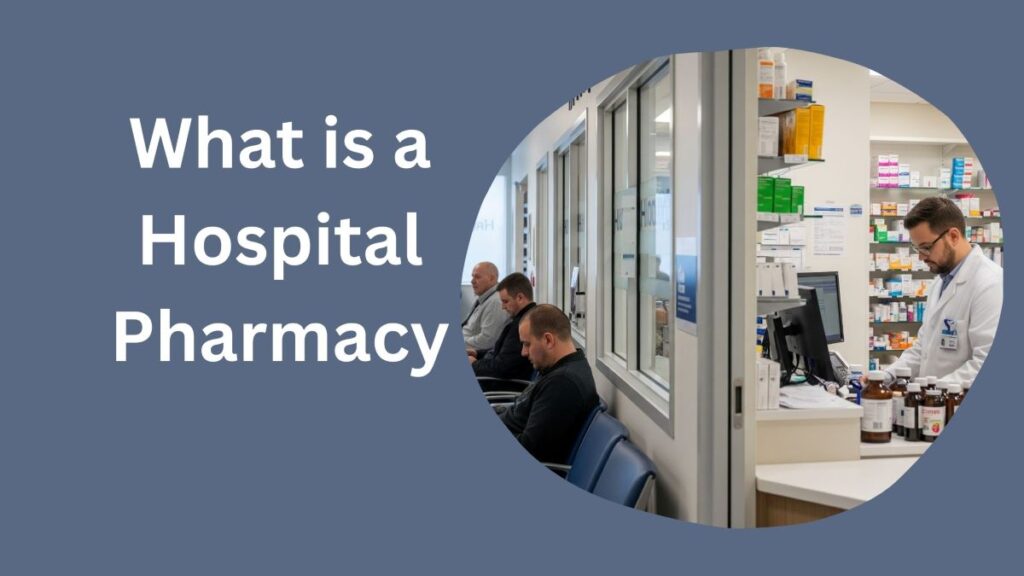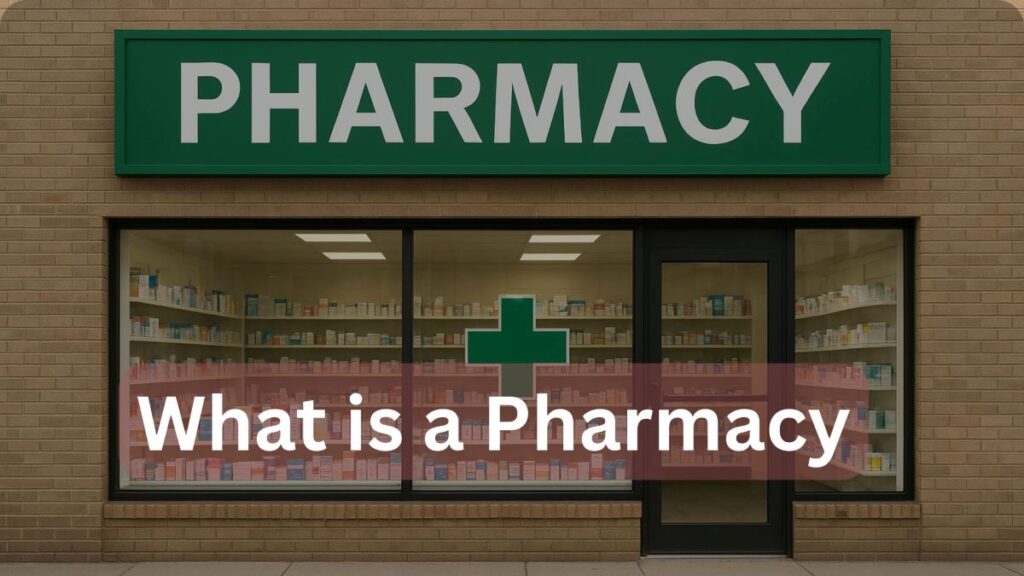Hospital pharmacy is a specialized field of pharmacy that operates within a hospital or healthcare facility. It focuses on the safe, effective, and efficient use of medications for patients. In India, hospital pharmacies play a critical role in the healthcare system, ensuring that patients receive the right medications at the right time while supporting doctors, nurses, and other healthcare professionals in delivering quality treatment. In this article we discuss what is hospital pharmacy, its functions and different sections of hospital pharmacy.
What is Hospital Pharmacy?
A hospital pharmacy is a department within a hospital responsible for the procurement, storage, preparation, dispensing, and monitoring of medications. Unlike retail or community pharmacies, which primarily serve the general public, hospital pharmacies cater to inpatients (admitted patients) and outpatients (those visiting for consultations or treatments). They are staffed by trained pharmacists who work closely with healthcare teams to optimize patient outcomes.
In India, hospital pharmacies are integral to both government and private hospitals, ranging from small clinics to large multi-specialty institutions. They ensure that medications are available, safe, and used appropriately, adhering to regulations set by bodies like the Pharmacy Council of India (PCI) and the Drugs Controller General of India (DCGI).
What are the Functions of a Hospital Pharmacy
Hospital pharmacies in India perform a wide range of functions to support patient care and hospital operations. Some of the primary responsibilities include:
1. Medication Dispensing and Management
- Hospital pharmacists dispense medications prescribed by doctors to inpatients and outpatients. They ensure accurate dosages, proper labeling, and clear instructions for use.
- They maintain an inventory of essential drugs, including life-saving medications, antibiotics, and specialized drugs for conditions like cancer or cardiac issues.
2. Clinical Pharmacy Services
- Pharmacists in hospitals often participate in clinical pharmacy, where they work directly with doctors and nurses to develop treatment plans. They review prescriptions to prevent drug interactions, allergies, or incorrect dosages.
- They provide patient counseling, educating patients about how to take their medications, potential side effects, and the importance of adherence to therapy.
3. Drug Procurement and Storage
- Hospital pharmacies source medications from trusted suppliers, ensuring quality and authenticity. In India, this is especially important to avoid counterfeit drugs, a concern in some regions.
- They store drugs under proper conditions (e.g., temperature control for vaccines or injectables) to maintain their efficacy.
4. Compounding and Preparation
- In some cases, hospital pharmacists prepare customized medications, such as intravenous (IV) solutions or compounded drugs tailored to a patient’s needs. This is common in pediatric or oncology wards, where standard formulations may not be suitable.
5. Ensuring Regulatory Compliance
- Hospital pharmacies in India adhere to strict regulations under the Drugs and Cosmetics Act, 1940, and other guidelines. They ensure proper documentation, narcotic drug management, and compliance with prescription protocols.
6. Patient Safety and Quality Assurance
- Pharmacists monitor for adverse drug reactions (ADRs) and report them to the Pharmacovigilance Program of India (PvPI).
- They implement quality control measures to ensure that medications are safe and effective, reducing medication errors.
Educational Qualifications for Becoming a Hospital Pharmacist in India
To become a hospital pharmacist in India, the minimum qualification required is a Diploma in Pharmacy (D.Pharm), after which one must register with the State Pharmacy Council to practice. However, most hospitals, especially large private and government institutions, prefer candidates with higher qualifications such as Bachelor of Pharmacy (B.Pharm) or Doctor of Pharmacy (Pharm.D). A Master of Pharmacy (M.Pharm) in fields like Clinical Pharmacy, Hospital Pharmacy, or Pharmacology further enhances career opportunities.
Role of Hospital Pharmacists in India
The role of hospital pharmacist in India include:
- Collaborating with Healthcare Teams: Pharmacists work with doctors, nurses, and dieticians to ensure holistic patient care. For example, they may recommend alternative drugs if a prescribed medication is unavailable or unsuitable.
- Antimicrobial Supervising: With the rise of antibiotic resistance in India, hospital pharmacists play a key role in promoting the rational use of antibiotics to prevent misuse.
- Managing Chronic Diseases: In conditions like diabetes, hypertension, or tuberculosis, pharmacists educate patients on long-term medication adherence and lifestyle changes.
- Emergency Services: In critical care units or emergency wards, pharmacists ensure the immediate availability of life-saving drugs like adrenaline or insulin.
What are the different sections of Hospital Pharmacy
A hospital pharmacy is organized in such a way that it can serve both admitted patients and those who come only for consultations. The setup usually includes different sections depending on the hospital size and the services provided.
Here are the main divisions:
1. Inpatient Pharmacy
- Located inside the hospital premises.
- Provides medicines only to patients admitted in wards, ICUs, or operation theatres.
- Medicines are supplied based on doctors’ prescriptions written in patient case sheets.
- Ensures timely availability of emergency drugs, life-saving injections, and IV fluids.
2. Outpatient Pharmacy
- Usually found near the hospital’s OPD (Outpatient Department).
- Functions similar to a community pharmacy but is part of the hospital system.
- Dispenses prescribed medicines to patients who come for consultation and then leave (not admitted).
- Helps reduce waiting time for patients and ensures hospital-prescribed medicines are easily available.
3. Satellite Pharmacies
- Satellite pharmacies are small units of mini-pharmacies located in specialized hospital areas like:
- ICU (Intensive Care Unit)
- Operation Theatre
- Emergency Department
- Cancer/Oncology wards
- Its purpose is to provide immediate access to critical medicines where quick treatment is required.
- Reduces delay in transporting drugs from the main pharmacy to these units.
4. Clinical Pharmacy Services
- A newer and growing concept in Indian hospitals.
- In this setup, pharmacists are directly involved in patient care.
- Roles include:
- Monitoring drug therapy
- Checking drug interactions
- Participating in medical rounds with doctors
- Educating patients about medicines
- Focus is on improving treatment outcomes and minimizing side effects.
The Future of Hospital Pharmacy in India
The role of hospital pharmacies in India is evolving with advancements in healthcare. Key trends include:
- Adoption of Technology: Many hospitals are implementing electronic health records (EHRs) and automated dispensing systems to improve efficiency and reduce errors.
- Expansion of Clinical Roles: Pharm.D graduates are increasingly involved in clinical decision-making, such as therapeutic drug monitoring and personalized medicine.
- Focus on Patient-Centric Care: Pharmacists are taking on more patient-facing roles, offering counseling and follow-up care to improve treatment outcomes.
- Telepharmacy: In remote areas, telepharmacy services are emerging to provide access to expert pharmacists via digital platforms.
Conclusion
Hospital pharmacies are the backbone of medication management in India’s healthcare system. They ensure that patients receive safe, effective, and timely treatment while supporting the broader goals of healthcare delivery. As the healthcare landscape in India continues to grow, hospital pharmacies will play an increasingly vital role in improving patient outcomes and advancing public health.


